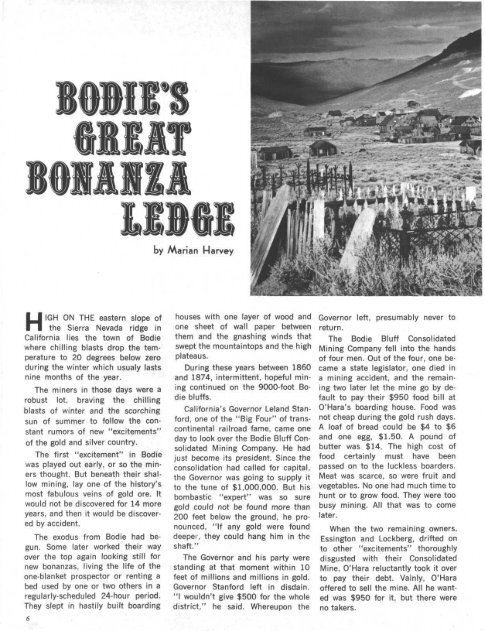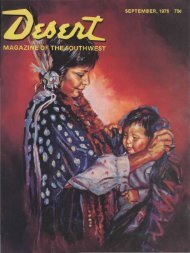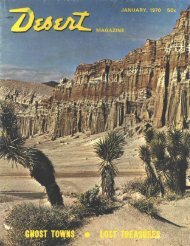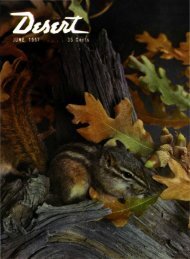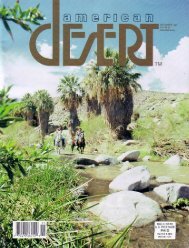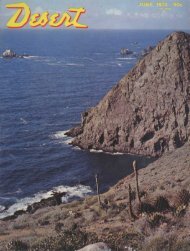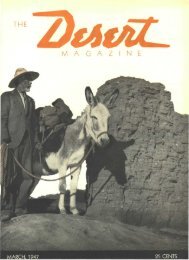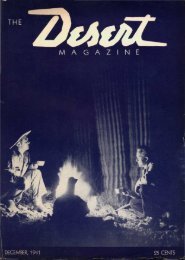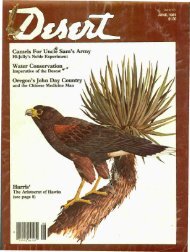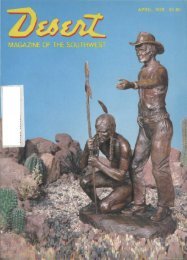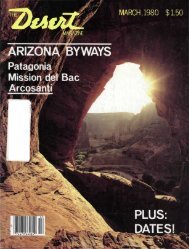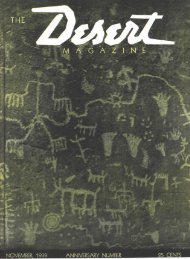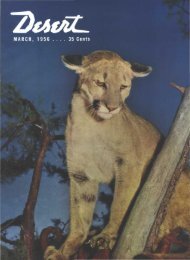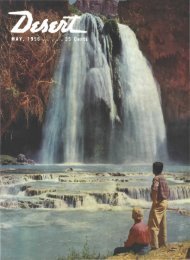Desert Magazine Book Shop - Desert Magazine of the Southwest
Desert Magazine Book Shop - Desert Magazine of the Southwest
Desert Magazine Book Shop - Desert Magazine of the Southwest
Create successful ePaper yourself
Turn your PDF publications into a flip-book with our unique Google optimized e-Paper software.
BODIE'S<br />
GREAT<br />
BONANZA<br />
LEDGE<br />
by Marian Harvey<br />
HIGH ON THE eastern slope <strong>of</strong><br />
<strong>the</strong> Sierra Nevada ridge in<br />
California lies <strong>the</strong> town <strong>of</strong> Bodie<br />
where chilling blasts drop <strong>the</strong> temperature<br />
to 20 degrees below zero<br />
during <strong>the</strong> winter which usualy lasts<br />
nine months <strong>of</strong> <strong>the</strong> year.<br />
The miners in those days were a<br />
robust lot, braving <strong>the</strong> chilling<br />
blasts <strong>of</strong> winter and <strong>the</strong> scorching<br />
sun <strong>of</strong> summer to follow <strong>the</strong> constant<br />
rumors <strong>of</strong> new "excitements"<br />
<strong>of</strong> <strong>the</strong> gold and silver country.<br />
The first "excitement" in Bodie<br />
was played out early, or so <strong>the</strong> miners<br />
thought. But beneath <strong>the</strong>ir shallow<br />
mining, lay one <strong>of</strong> <strong>the</strong> history's<br />
most fabulous veins <strong>of</strong> gold ore. It<br />
would not be discovered for 14 more<br />
years, and <strong>the</strong>n it would be discovered<br />
by accident.<br />
The exodus from Bodie had begun.<br />
Some later worked <strong>the</strong>ir way<br />
over <strong>the</strong> top again looking still for<br />
new bonanzas, living <strong>the</strong> life <strong>of</strong> <strong>the</strong><br />
one-blanket prospector or renting a<br />
bed used by one or two o<strong>the</strong>rs in a<br />
regularly-scheduled 24-hour period.<br />
They slept in hastily built boarding<br />
6<br />
houses with one layer <strong>of</strong> wood and<br />
one sheet <strong>of</strong> wall paper between<br />
<strong>the</strong>m and <strong>the</strong> gnashing winds that<br />
swept <strong>the</strong> mountaintops and <strong>the</strong> high<br />
plateaus.<br />
During <strong>the</strong>se years between 1860<br />
and 1874, intermittent, hopeful mining<br />
continued on <strong>the</strong> 9000-foot Bodie<br />
bluffs.<br />
California's Governor Leland Stanford,<br />
one <strong>of</strong> <strong>the</strong> "Big Four" <strong>of</strong> transcontinental<br />
railroad fame, came one<br />
day to look over <strong>the</strong> Bodie Bluff Consolidated<br />
Mining Company. He had<br />
just become its president. Since <strong>the</strong><br />
consolidation had called for capital,<br />
<strong>the</strong> Governor was going to supply it<br />
to <strong>the</strong> tune <strong>of</strong> $1,000,000. But his<br />
bombastic "expert" was so sure<br />
gold could not be found more than<br />
200 feet below <strong>the</strong> ground, he pronounced,<br />
"If any gold were found<br />
deeper, <strong>the</strong>y could hang him in <strong>the</strong><br />
shaft."<br />
The Governor and his party were<br />
standing at that moment within 10<br />
feet <strong>of</strong> millions and millions in gold.<br />
Governor Stanford left in disdain.<br />
"I wouldn't give $500 for <strong>the</strong> whole<br />
district," he said. Whereupon <strong>the</strong><br />
Governor left, presumably never to<br />
return.<br />
The Bodie Bluff Consolidated<br />
Mining Company fell into <strong>the</strong> hands<br />
<strong>of</strong> four men. Out <strong>of</strong> <strong>the</strong> four, one became<br />
a state legislator, one died in<br />
a mining accident, and <strong>the</strong> remaining<br />
two later let <strong>the</strong> mine go by default<br />
to pay <strong>the</strong>ir $950 food bill at<br />
O'Hara's boarding house. Food was<br />
not cheap during <strong>the</strong> gold rush days.<br />
A loaf <strong>of</strong> bread could be $4 to $6<br />
and one egg, $1.50. A pound <strong>of</strong><br />
butter was $14. The high cost <strong>of</strong><br />
food certainly must have been<br />
passed on to <strong>the</strong> luckless boarders.<br />
Meat was scarce, so were fruit and<br />
vegetables. No one had much time to<br />
hunt or to grow food. They were too<br />
busy mining. All that was to come<br />
later.<br />
When <strong>the</strong> two remaining owners,<br />
Essington and Lockberg, drifted on<br />
to o<strong>the</strong>r "excitements" thoroughly<br />
disgusted with <strong>the</strong>ir Consolidated<br />
Mine, O'Hara reluctantly took it over<br />
to pay <strong>the</strong>ir debt. Vainly, O'Hara<br />
<strong>of</strong>fered to sell <strong>the</strong> mine. All he wanted<br />
was $950 for it, but <strong>the</strong>re were<br />
no takers.


